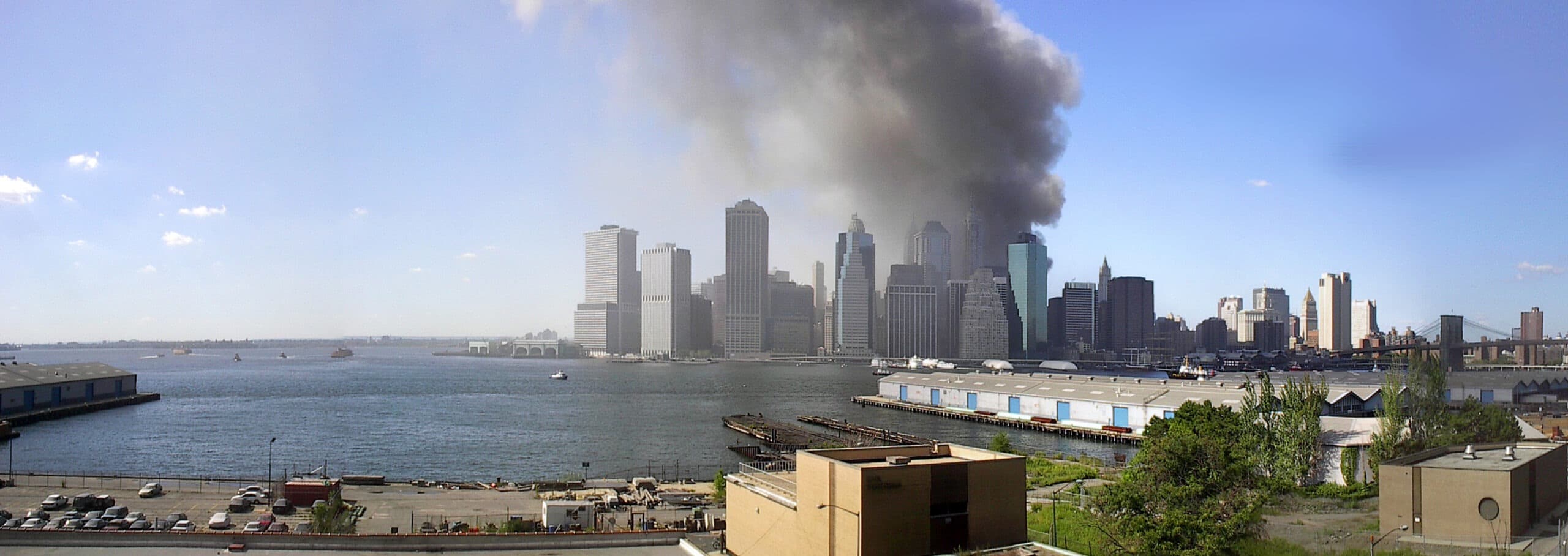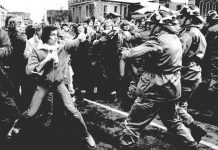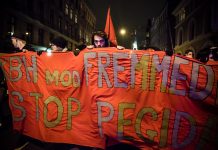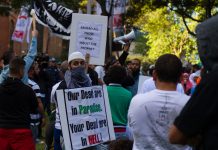Den 11. september 2001 blev World Trade Center i New York udsat for et omfattende terrorangreb.
Indhold
- Forord
- Artikler og artikelsamlinger på dansk og nordisk + Litteratur
- Articles in English
- Web sites and collections of articles (in English)
- Se også på Socialistisk Bibliotek
Forord
Den 11. september 2001 blev World Trade Center i New York udsat for et omfattende terrorangreb. Her to år efter har vi samlet en række artikler og sites, som diskuterer terrorangrebet og konsekvenserne, den globale terrorisme (herunder statsterrorismen), Bush-regimets offensiv for at styrke USAs globale magt, de nykonservative i USA og angrebene på de demokratiske rettigheder.
De udvalgte artikler er hovedsagelig fra venstrefløjspressen, mens sites og artikelsamlingerne er bredere udvalgt.
Se også linkboxene:
Bjarne A. Frandsen, September 2003.
Revideret september 2021.
Artikler og artikelsamlinger på dansk og nordisk + Litteratur
11. september – verdens tilstand 10 år efter
Redigeret af Malene Fenger-Grøndahl (Aarhus Universitetsforlag, 2011, 324 s.).
“I bogen efter tegner en række forskere et kort over den verden, der trådte frem af Ground Zero. Økonomisk, politisk, socialt. I medierne, i vores kollektive erindring, i billedkunsten og i litteraturen. I det muslimske verdenssamfund og blandt unge muslimer i Danmark. I terrorbekæmpelsen og de militære strategier.”
Uddrag fra bogen (Kritisk Debat, 15. oktober 2011; online på DocPlayer):
11. september – ti år efter: lad os droppe historien om de godes kamp mod de onde. Af Malene Fenger-Grøndahl.
11. september og dens myter. Anmeldelse af Irene Clausen (Arbejderen.dk, 4. november 2011).
Barbariernas kamp – 11 september och den nya världsordningen
Av Gilbert Achcar (Röda Rummets förlag, 2003, 92 s.; online på Marxistarkiv.se, pdf).
“I den ström av böcker om Mellanöstern, islam och USA som nu ges ut fyller denna bok en funktion, just för sin radikala analys av bägge sidorna – bägge barbarierna. USA:s politik och dess bakomliggande motiv beskrivs i polemik mot de officiella förklaringarna. Politiken i arabvärlden och den islamiska fundamentalismen förklaras mot bakgrund av den sociala upplösningen i Mellanöstern.”
Denstoredanske
Demos Nyhedsbrev
Tema: USAs strategier for opretholdelsen af verdensherredømmet (nr. 88, forår 2006, 36 s.). Scroll ned til nummer.
“Demos har de sidste tre år afholdt en række møder og udgivet flere numre af Nyhedsbrevet med fokus på krigen i Irak. Det sidste møde, som blev afholdt i september 2005, omhandlede bl.a. USAs forsøg på at opretholde verdensherredømmet, dets undertrykkelsesmetoder historisk og aktuelt samt det økonomiske kaos i Irak. Vi har samlet nogle af indlæggene fra mødet, som vi bringer her i Nyhedsbrevet.”
Tema: Den nye amerikanske verdensorden (nr. 77, vinter 2003, 20 s.). Scroll ned til nummer.
“Den 25. oktober afholdt Foreningen Demos et debatmøde om den nye verdensorden med fokus på USA som førende supermagt … Oplægsholderne var journalist Michael Seidelin, som talte om de nykonservatives magt og indflydelse i Bush-regeringen; journalist og forfatter Carlo Hansen gav et indblik i, hvorledes USA og Israel samarbejder om en strategi i Mellemøsten; historiker og forfatter Morten Thing talte om Israel som jødisk stat og dets interesser; cand. mag. Nicolai Bendtsen og Erik Jensen fra Demos ridsede op, hvorledes olien historisk og aktuelt spiller en vigtig rolle i kampen om verdensherredømmet.”
FaktaLink
Maria Sigrid Lauritsen og Malene Grøndahl: 11. september 2001 (17. november 2005, 23. s.).
Indhold: Introduktion – Terrorhandlingens forløb – Terroristerne – Opklaring og undersøgelse – Konsekvenserne af 11. september – Kilder.
Jørgen Staun og Malene Grøndahl: Terrorisme før og nu (marts 2015).
Indhold: Introduktion – Terrorismens forhistorie – Terrorens årsager – Terrorgruppernes ideologi – Aktionsformer og våben – Danske terrorangreb – Kilder.
Malene Grøndahl: Terrornetværket al-Qaeda (maj 2011).
Indhold: al-Qaedas baggrund og historie – al-Qaedas ideologi og målsætning – al-Qaedas opbygning og struktur – al-Qaedas ledelse.
al-Qaedas udbredelse – al-Qaedas aktioner – al-Qaedas støtter og kontakter – Bekæmpelse af al-Qaeda – Kilder.
Malene Grøndahl: Den danske antiterrorlov (marts 2013).
Indhold: Anti-terrorloven – Kritikken af den danske anti-terrorlov – Kilder.
Leksikon for det 21. århundrede
- Albert Jensen / Paul Hedlund: Terrorisme
Med historie og statistik. - Albert Jensen: Neokonservatisme
Længere artikel med links. - Bin Laden, Osama
- Islamisk fundamentalisme
Modkraft.dk/Kontradoxa
Mikkel Bolt: Uvidenhedens tidsalder (27. november 2007).
“Med vold skal denne verden destrueres og en ny opstå. Den militante islamismes brug af vold er imidlertid et symptom på håbløshed. Et egentligt antikapitalistisk projekt er fraværende.”
Tariq Ali: Imperialisme før og nu (28. oktober 2003).
“Jo tydeligere imperialismen fremtræder, desto flere er bortforklaringerne på, hvorvidt imperialismen overhovedet eksisterer.”
Netavisen/Kommunistisk Politik
- Tema: Terrorkrig 2002: kampen om olie, militærmagt og verdensherredømme (online på Internet Archive).
Socialistisk Information
Gilbert Achcar: 11. september, bin Laden, USA og de arabiske oprør: Risikoen for folkemagt (10. september 2011).
“De arabiske opstande har flyttet heltestatus fra Osama bin Laden til folket, et skifte, som kan slå tilbage mod USA. Stillet over for det arabiske folk og dets ønsker, kan Washington meget velkommen til at fortryde tabet af den belejlige fjende, som bin Laden udgjorde.”
Claude Serfati: Militarisme og imperialisme i det 21. århundrede (nr.177, juni 2003, s.27-30).
“Forholdet mellem militarisme, krig og kapitalisme har fået en ny relevans her i begyndelsen af det 21. århundrede. Bush-regeringens doktrin om ‘krig uden grænser’ er en betydningsfuld ændring i militarismens rolle i den amerikanske kapitalisme. Mere end nogensinde fremtræder globaliseringen af kapital og militarisme som to sider af den imperialistiske dominans.”
USAs globale spil. Interview med Peter Gowan (nr.166, juni 2002, s.20-22).
“Peter Gowan er redaktør på ‘New Left Review’ og udgav i 2000 bogen ‘Global Gamble – America’s Faustian Bid for World Domination’, som vandt Isaac Deutschers mindepris. I lyset af begivenhederne efter 11. september forekommer hans argumentation om USA´s forsøg på at opnå en absolut dominans i verden bemærkelsesværdigt præcis.”
Norm Dixon: Da Cia var Bin Ladens arbejdsgiver (nr.158, oktober 2001, s.3-5).
“USA har ikke altid frygtet og bekæmpet fundamentalistiske terrorister. Da det gjaldt den kolde krig mod Sovjetunionen var USA tværtimod dybt involveret i at finansiere, udruste og træne en fundamentalistisk hær i Afghanistan.”
Tema: Efter terrorangrebene (nr.158, oktober 2001, s.3-8, 12-22).
Solidaritet
Bin Laden vandt i sidste ende (12. september 2021).
“Den saudiske superterrorist fik alle sine ønsker opfyldt – og han kunne ikke have klaret det uden os. Foreløbigt har Osama Bin Laden vundet – men der er stadig mulighed for, at USA kan få det sidste ord, skriver den amerikanske filminstruktør og samfundsaktivist, Michael Moore.”
James Petras: Det nye imperiums år 1: efter 11. september 2001 (nr.4, december 2002, s.12-20; online på Internet Archive).
“Efter den 11. september er parolen om terrorisme blevet den alt afgørende for USAs politik – men hvem tjener dette formål? Petras fortæller om opbygningen af USA til et nyt imperialistisk centrum, det nye imperium, om den politiske baggrund, Bush-doktrinen og amerikansk politisk lederskab, som det ser ud i dag.”
Tema: Vanviddet efter den 11. september (oktober 2001, 47 s.; online på Internet Archive).
Indstik produceret i fællesskab af Solidaritet (nr.4, oktober 2001), Demos Nyhedsbrev og Gaia (nr.35, efterår 2001).
Bidrag fra bl.a. Noam Chomsky, Michel Chossudovsky, Robert Fisk og Tariq Ali.
Stop Terrorkigen
Tema: Bush-doktrinen: Manifest for et verdensdiktatur (online på Internet Archive)
Oplæg, artikler og dokumenter på engelsk og dansk om National Security Strategy (2002) og Bushs State of the Union (2002). Se bl.a.:
Bush-doktrinen: Citater på dansk fra National Security Strategy.
Videnskab.dk
Lars Erslev Andersen: 20 år efter 9/11: Det har vi lært af krigen mod terror (Forskerzonen, 11. september 2021).
“Vesten kæmper stadig med at finde en måde, hvorpå bekæmpelse af terror og demokrati kan følges ad.”
Wikipedia, den frie encyklopædi
- Terrorangrebet den 11. september 2001
Leksikal artikel med mange links.
Tirsdag 11. september 2001: eftertanker
En antologi red. af Claus Clausen pg Rasmus Øhlenschlæger Madsen (Tiderne Skifter, 2001, 175 s.). Med bidrag af bl.a. Tariq Ali, Terry Eagleton, Hans Magnus Enzensberger, Robert Fisk, José Saramago, Susan Sontag, Arundhati Roy + online på dansk:
Zygmunt Bauman: Den eksplosive elendighed (Information.dk, 15. september 2001).
Edward Said: Islam og Vesten er falske feltråb (Information.dk, 18. september 2001).
Salman Rushdie: Den skjulte krig kan ikke vindes (Information.dk, 4. oktober 2001).
Articles in English
Against the Current
Thomas Abowd: Arabs and Muslims after 9/11 (No.164, May-June 2013). Review of Evelyn Alsultany, Arabs and Muslims in the Media: Race and Representation After 9/11 (New York University Press, 2012) + Nadine Naber, Arab America: Gender, Cultural Politidcs, and Activism (New York University Press, 2012).
The editors: The years of 9/11 (No.154, September-October 2011).
“For those who choose to look, these years have brought our society face to face with its real condition, and it’s not pretty. We try to explore a few pieces of the picture in our tenth anniversary coverage in this issue.”
John O’Connor: 9/11 and the clash of atrocities (No.154, September-October 2011).
“Theoretically and politically, 9/11 has forced the left to reflect on the nature of imperialism today. And it has forced the left to assess the successes and failures of both the Global Justice and antiwar movements. Thinking about these issues is essential if we are going to rebuild the left.”
Julie Hurwitz: Ten years later: We’re less free (No.154, September-October 2011).
“In the post-9/11 era, however, we face new and in many respects more serious challenges regarding the increasingly deteriorating state of civil, constitutional, human and political rights. Of equal or more concern, there seems to be less resistance to the assault on our rights than there was in the past.”
Michael Ratner: Fortress America, 2001: Are we safer? (No.95, November/December 2001).
“This article will discuss the domestic consequences of the war on terrorism, almost all of which will involve some curtailment of our freedom and constitutional rights.”
David Finkel: Looking over the edge (No.95, November/December 2001).
“I will argue here that the September 11 attacks were carried out by a force that is totalitarian and absolutely reactionary (I would actually say, in certain important respects, nazilike) in its core objectives, not only in its methods. But this must not be confused with accepting U.S. claims to be fighting a defensive, anti-terrorist war; nor can the legitimate anger of tens of millions of Arabs against the killing of Palestinians and starvation of Iraqis be confused with the ‘fatwas’ of Osama bin Laden.”
AlterNet
Chalmers Johnson: Bush’s response to 9/11 was deadlier than the attacks themselves: Intellectual fallacies of the war on terror (October 23, 2007; online at Internet Archive).
“A look at how and why the U.S. gravely failed in its response to 9/11.”
Counterfire
9/11 and the legacy of endless war (September 11, 2021).
“John Clarke analyses US imperialism in the twenty years since the September 11th terrorist attacks.”
9/11, the war on terror, and the new Imperialism, Part 104 in Neil Faulkner: A Marxist History of the World (Counterfire, 9 December 2012).
“The Al-Qaida terror attacks allowed the great powers to justify new imperialist wars to safeguard the interests of global capital.”
CounterPunch
Noam Chomsky: Was there an alternative? (September 6, 2011).
“There is every likelihood that the Jihadi movement, much of it highly critical of bin Laden, could have been split and undermined after 9/11. The ‘crime against humanity’, as it was rightly called, could have been approached as a crime, with an international operation to apprehend the likely suspects.”
Robin Blackburn: Terror and Empire: A CounterPunch Special Report (November 2001; online at Internet Archive) + at Marxsite (27 p.; online at Internet Archive).
“CounterPunch is proud to publish Robin’s booklength report, the first extended radical analysis of the post September 11 world, what the terror war is all about, and how a just war on terror could be fought and won”.
Estrategia Internacional
Juan Chingo and Aldo Santos: Bush’s war offensive: An attempt to redefine imperialist hegemony (No.19, January 2003).
“Some commentators, basing themselves on the fact that the USA has renewed its intervention into other countries as an aggressive response to September 11, and on America’s unchallenged military might, hold the view that we are on the threshold of a new era of American supremacy. In this article we will start by analysing the crisis of the world economy that is behind America’s attempt to redesign the world order in a more violent fashion; and then discuss whether it is possible for the US to succeed or whether this new course will accelerate its decline and open a new stage of world ‘disorder’.”
In Defence of Marxism
Alan Woods: Ten years after 9/11: how the world has changed (9 September 2011).
“The events of September 11th 2001 undoubtedly represented a turning-point in history. The tenth anniversary of the attacks on the Twin Towers and the Pentagon provides us with an opportunity to make a balance sheet of the past decade, a decade that has reshaped the history of the world.”
Alan Woods: Nine years after 9/11: is the world a safer place? (10 September 2010).
“As a Marxist, I am no friend of conspiracy theories that attempt to explain history in terms of the plans of malignant or beneficial individuals and groups. In general, these ‘explanations’, which are always of an idealist, if not utterly mystical, character, explain nothing at all.”
Fred Weston: September 11 and the total failure of Bush’s adventures (11 September 2007).
“Bush cynically exploited the events of September 11, 2001 to carry out his own agenda. This was not in the interests of either the American people or the peoples of the Middle East and beyond. It was supposed to be in the interests of a small clique of super-rich, but even on this front they have failed.”
Nadim al-Mahjoub: 9/11 and the functions of the ‘War on Terror’ (11 September 2006).
“Five years on from the attack on the Twin Towers we can see how it was used to justify a war for oil and a general clampdown on civil liberties all around the world. We have also seen revolutionary movements, particularly in Latin America which will inevitably cut through the fog of confusion the capitalist have attempted to throw up.”
Five years after 9/11 (11 September 2006).
“We are reproducing two articles written by Alan Woods and Ted Grant at the time of the attack on the Twin Towers in 2001. They explained how this attack would be used by the ruling class to justify their plunder of the resources of the world and to clamp down on workers’ rights.”
International Socialism
Gareth Jenkins: Marxism and terrorism (Issue 110, Spring 2006, p.61-83).
“Terrorism, in the sense of planting bombs or assassinating individuals to achieve political ends, is not new. Socialists have had to work out their attitude to it from the time of Marx onwards. Gareth Jenkins traces the tradition of disagreeing with the tactic but sympathising with the anger that produces it.”
Chris Harman: Analysing imperialism (Issue 99, Summer 2003, p.3-81).
“Imperialism has been the word on the lips of millons in the last two war-filled years. But there is disagreement as to what it really means: is waging war only of benefit to the arms manufactures and the multinationals gaining lucrative contracts to rebuild war-ravaged countries? Or does it run deeper than that, to the heart of the logic of capitalism? Chris Harman takes us through the bloody 20th century. He shows how a clear understanding of the relationship between military and economic competition is crucial for building an effective anti-imperialist movement today.”
Alex Callinicos: The grand strategy of the American empire (Issue 97, Winter 2002, p.3-38).
“Alex Calinicos analyses the new United States foreign policy. In the recently revealed ‘National Security Strategy’ document the Bush administration has clearly broken with the pattern of the Cold War era to develop an even more aggressive pursuit of its imperial goals. But what are the strategic and economic motives that are driving this new policy? And does the US have the unparalleled economic strength that can support such renewed imperial drive?”
John Rees: Imperialism: Globalisation, the state and war (Issue 93, December 2001, p.3-30).
“The basic paradox underlying the US imperial project at the beginning of the 21st century is this – it has military capability beyond reach of most of its competitors, but it does not have the economic capability to rebuild a world economy repeatedly suffering recession and slow growth at the core, and devastation in much of its periphery.”
International Socialist Review
Ashley Smith: Rehabilitating U.S. intervention: U.S. imperialism in the age of Obama (Issue 78, July–August 2011).
“Obama’s grand strategy of engagement is designed to co-opt its international and regional rivals into the neoliberal capitalist order and quell any threat from below. Far from delivering peace and justice, Obama’s strategy has led him to oversee several wars, launch new ones, escalate CIA black ops, and organize a counterrevolution against the Arab Spring to preserve American control over the Middle East.”
Lance Selfa: A new colonial ‘Age of Empire’ (Issue 23, May-June 2002).
“After spending decades at the bottom of history’s dustbin, colonialism is back. The political right, feeling emboldened to offer up its most hoary proposals to the rampaging Bush administration, is making the case for a U.S.-run world empire.”
Ahmed Shawki: The rehabilitation of colonialism (Issue 21, January-February 2002).
“The war in Afghanistan has produced an orgy of self-congratulation within U.S. ruling circles. Leave aside the estimated 4,000 dead civilians, the return of a motley crew of gangsters who helped to pave the way for the Taliban’s rule the last time they were in power between 1992 to 1996, or the millions of refugees who are on the brink of starvation. This is apparently a small price to pay to show the world the power of the United States to impose its will.”
Paul D’Amato: The decline of anti-imperialism (Issue 21, January-February 2002).
“The opening of the U.S. ‘war on terrorism’ – the relentless air assault on Afghanistan supplemented by warlord armies on the ground – has toppled the Taliban regime and replaced it with these same warlords. This phase of the war enjoyed virtually unanimous support among liberals and liberal organizations that in peacetime would be identified as critics of the Bush administration.”
Theme: Why we oppose this war (Issue 20, November-December 2001).
With Noam Chomsky, William Blum and John Pilger about Washington’s real war aims.
International Viewpoint
Gilbert Archcar: 9/11, bin Laden, the USA and the Arab uprisings: The perils of people power (Issue 440, September 2011).
“The Arab uprisings have shifted hero status from Osama bin Laden to the people, a shift that could backfire on the United States.”
Jan Malewski: The dubious victory (Issue 350, June 2003).
“Victory was achieved by the world’s most powerful army, supported by 45,000 British soldiers and a handful of Polish commandos, enjoying absolute control of the air. Opposing them was an Iraqi army which had been largely destroyed at the time of the Gulf war of 1991, subjected since then to an embargo, partially disarmed by the UN weapons controllers, and whose anti-aircraft equipment had been regularly bombarded for more than ten years. Such a result should have constituted a surprise for nobody.”
Claude Serfati: Militarism and imperialism in the 21st century (Issue 348, March 2003).
“The relationship between militarism, war and capitalism has a new relevance at the beginning of the 21st century. This ‘war without limits’, the new political programme adopted by the Bush Administration, marks a significant change of in the militarism of US capitalism, and more than ever, the globalisation of capital and militarism appear as two aspects of imperialist domination.”
Claudio Katz: Imperialism in the 21st century (Issue 345, November 2002).
“The renewal of interest in the study of imperialism has changed the debate on globalisation, previously centred exclusively on the critique of neo-liberalism and on the new features of globalisation. A concept developed by the main Marxist theorists of the 20th century – which enjoyed a wide diffusion in the 1970s – has again attracted the attention of analysts because of the aggravation of the social crisis of the Third World, the multiplication of armed conflicts and the deadly competition among countries.”
Phil Hearse: Year Zero: Twelve months after the ‘war on terrorism’ (Issue 343, September 2002).
“Bush and the recycled Reaganite team around him launched a military-political offensive whose central aim was to forcefully extend the hegemony of US capitalism and the American state worldwide, while dealing sharp blows against all the Bush administration’s perceived enemies and rivals: centrally, third world liberation movements, the global justice movement, domestic political rivals and America’s political-economic rival states in Europe.”
Jacobin
Branko Marcetic: We have new evidence of Saudi involvement in 9/11, and barely anyone cares (March 25, 2022)
“The FBI has quietly revealed further evidence of Saudi government complicity in the September 11 attacks — and nothing’s happened.”
Branko Marcetic: Twenty years ago, the Saudis got away with the crime of the century (September 12, 2021).
“Despite copious evidence of Saudi complicity in the September 11 attacks, the Bush administration and its successors have spent twenty years shielding the country’s elite from accountability while making war on an ever-growing list of other Middle East countries.”
Branko Marcetic: Twenty years ago, the mainstream press created the war on terror (September 11, 2021).
“Two decades ago, the mainstream media responded to the September 11 attacks by stacking their news coverage and pundit commentary with the country’s most belligerently pro-war voices. We are still paying for their appalling misjudgment.”
Michael Schwartz and Richard Lachmann: 9/11 was a disaster for the people of Iraq (September 11, 2021).
“The Bush administration was already planning to invade Iraq before 9/11, but the attacks supplied the necessary pretext. The catastrophic war that followed turned Iraq into an ungovernable wasteland.”
Branko Marcetic: 9/11 could have been a moment to reflect on US violence around the world (September 10, 2021).
“Instead, the quest to avenge just shy of 3,000 civilian deaths in New York and Washington has now resulted in the deaths of at least 400,000 civilians.”
Toufic Haddad: Israel took advantage of 9/11 to wage war on Palestine (September 10, 2021).
“Israel’s leaders exploited the US reaction to 9/11 to demonize Palestinian resistance to the occupation. They have used the discourse of “counterterrorism” to entrench a system of apartheid, while exporting repressive methods and weapons around the world.”
James Petras Website
James Petras: Nine Eleven: One year of empire building (August 12, 2002).
“In the year since 9/11 the Bush Administration has been engaged in a massive, second effort to impose a New World Order which Bush’s father attempted in the aftermath of the 1991 Gulf War a decade earlier. To understand the current Administration’s effort at empire building it is essential to locate it historically, particularly in the context of the previous decade and the failed effort of Bush’s father and the limited imperial advances of the Clinton presidency.”
Links: International Journal of Socialist Renewal
Malik Miah, Barry Sheppard and Caroline Lund: The Bush doctrine (Issue 22, Sep/Dec 2003).
“The criminal September 11, 2001, attacks were greeted by the Bush administration as a godsend. The shock and horror experienced by the US people were mobilised into support of a new, open-ended ‘War on Terrorism’ designed to give a blank cheque to a new stage of US military aggression. This war represents a qualitative change in policy from one of containment to one of more active aggression to destroy enemies who stand in the way of greater US world domination.”
Peter Boyle: Why imperialism will lose the first war of the 21st century (Issue 20, Jan/April 2002).
“Imperialism has been quick to make use of the opportunity offered to it by the September 11 terrorist attacks in New York and Washington. Within weeks, the Bush administration had a ‘successful’ war against Afghanistan under its belt and was raising the possibility of attacks on Iraq and other enemies. But imperialism’s gains so far are quite limited and very transient, because the aftermath of September 11 has not restored the system’s political credibility, even in the imperialist centers.”
Middle East Report
Darryl Li: Refusing imperial amnesia in the war on terror (Issue 300, 2021).
“MERIP’s coverage of the resulting Global War on Terror counters the willful amnesia of American nationalism with a rigorous insistence on illuminating the historical continuities of imperial violence.” With links to MERIP-articles 1986-2021.
Monthly Review
Theme: Imperialism Now (Vol.55, No.3, July-August 2003, 144 p.).
“The articles on imperialism in this special issue were all written in honor of Harry Magdoff’s ninetieth birthday. Most of them grew out of papers presented at the ‘Imperialism Today’ conference organized to celebrate Harry’s life and work on May 3, 2003.”
Af indholdet:
John Bellamy Foster: The new age of imperialism (p.1-14).
“Imperialism is meant to serve the needs of a ruling class much more than a nation. It has nothing to do with democracy. Perhaps for that reason it has often been characterized as a parasitic phenomenon-even by critics as astute as John Hobson in his 1902 classic, Imperialism: A Study. And from there it is unfortunately all too easy to slide into the crude notion that imperialist expansion is simply a product of powerful groups of individuals who have hijacked a nation’s foreign policy to serve their own narrow ends.”
Theme: Terror crisis in context (Vol.53, No.6, November 2001, p.1-58).
“In the face of the events of September 11, we have put together this issue devoted to the terrorist attack and the war crisis in a state of great urgency; a task made more difficult by the fact that our New York location has meant that all of those who work at MR were personally affected somehow by the attack on the World Trade Center. The result of these efforts is before you. The purpose of this issue, we should add, is not so much to address the events of September 11 themselves, as to look at how the heavy hand of the U.S. imperial system is coming down in retaliation (U.S. military strikes in Afghanistan have just begun as we go to press), the need to prevent a global slaughter, and the long–term consequences.”
New Left Review
Perry Anderson: Force and consent (Issue 17, September-October 2002).
“As war looms again in the Middle East, what are the aims of the Republican Administration, and how far do they mark a break in the long-term objectives of US global strategy? The changing elements of American hegemony in the post-Cold War world.”
Mike Davis: The flames of New York (Issue 12, November-December 2001).
“Premonitions and hallucinations of the fate of the Twin Towers, from H.G. Wells to Ernst Bloch, John Dos Passos to Sayyid Qutb. Today’s Palmer raids and tomorrow’s ‘security cities’ as first instalments in the globalization of fear.”
New Politics
Julius Jacobson: On liberal & left responses to Bush’s war on democracy (Issue 33, Summer 2002, p.5-31).
“It was the responsibility of what there is of an American left, in response to the war in Afghanistan, to wage its own political war on two fronts. First, to reveal all that is unjust and selfdefeating in Washington’s war without end. At the same time, the left was under a no less firm moral and political obligation to be uncompromising in its opposition to both the terrorist means and antisocial ends of religious fundamentalism.”
See also:
Discussion and debate on the ‘War on Terrorism’, Letters from Richard Greeman, John Halle, David McReynolds, Sam Friedman, Jason Schulman, Horst Brand, James Petras, Michael Parenti, Edward S. Herman/Response by Julius Jacobson (Issue 34, Winter 2003, p.19-42).
Theme: Myth and reality: ‘The war on terrorism’ (Issue 32, Winter 2002, p.5-68).
New Statesman
Michael Lind: The weird men behind George W. Bush’s war (April 12, 2003; online at Third World Traveler).
“Imagine a new British invasion of Egypt orchestrated by the followers of Ian Paisley, and you will have some idia of what is happening in Washington. Michael Lind dissects a neoconservative coup.”
Se debate about the article at History News Network:
Alan Wald: Are Trotskyites running the Pentagon? (23.06.2003) + Michael Lind: I was smeared (30.06.2003) + Alan Wald: Who is smearing whom? (30.06.2003).
New York University
Alex Strick van Linschoten and Felix Kuehn: Separating the Taliban from al-Qaeda: The core of success in Afghanistan (pdf) (A CIC Study, February 2011, 12 p.).
“The Taliban leaders do not seem to have had foreknowledge of the September 11 attacks. Bin Laden effectively manipulated the Taliban, using their lack of international experience to advance his own goals.”
RedFlag: A Voice of Resistance
Rebecca Barrigos: Fifteen years of the war on terror (2 September 2016).
“Fifteen years after 9/11, the people of the Middle East are still paying a terrible price for the U.S. drive to dominate the region.”
Red Pepper
Max Fraad Wolff: Neo-conservatism and the politics of paranoia (June 2003).
“The founders and first generation of the neo-conservatism movement that now dominates Washington are either deceased or older than the septuagenarian US defence secretary Donald Rumsfeld. In decades past neo-con believers remained off-stage, occasionally appearing in moments of crisis or opportunity. These appearances were brief and failed to attract sufficient attention to provoke public debate. The movement is now over 60 years old. It is neither a conspiracy nor a cabal operating on US foreign policy. It is a robust, well-funded ideological movement with representatives in charge of leading think-tanks, global media outlets, universities and the Bush presidency. There is no cover-up; information on the movement is easy to attain.”
Socialism Today
Peter Taaffe: The consequences of 9/11: A world turned upside down (Issue 151, September 2011).
“It is ten years since the twin towers came crashing down in New York. In the aftermath of that terrorist attack, US imperialism unleashed mass slaughter in Afghanistan and Iraq, leading some to believe that an era of total domination by the world’s only superpower had arrived. But today’s global economic crisis and US impotence in the face of revolution in North Africa and the Middle East has exposed the falsity of that view.”
Socialist Review
Jack Farmer: The legacy of September 11 (Issue 361, September 2011).
“The 11 September terror attacks were used to justify the West’s “war on terror”. But what is the legacy of 9/11 today?”
Alex Callinicos: War and Resistance: Bush’s terror two years on (Issue 277, September 2003).
“Two years after Washington launched the ‘war on terrorism’, Alex Callinicos examines the motivations of the neo-cons and the difficulties they face.”
Socialist Register
Vivek Chibber: American militarism and the US political establisment: The real lessons of the invasion of Iraq (2009).
“The American invasion of Iraq has been a catastrophe of epic proportions for the Iraqi population … But it has also been a significant disaster for Bush and American global power more generally.”
Socialist Worker
Simon Basketter: Twenty years of the West’s bloody war on terror (Issue 2771, 5 September 2021).
“Socialist Worker looks at the destruction wrought by two decades of wars, lifts the lid on the torture that accompanied it, and addresses the Islamophobia that was used to justify it all.”
Alex Callinicos: Power failure: ten years since 9/11 (Issue 2268, 10 September 2011).
“The wars that followed 9/11 were supposed to prove US power to the world, but, says Alex Callinicos, they have done the opposite.”
Mike Davis: 9/11- the embers of September (Issue 2268, 10 September 2011).
“A decade on from 9/11, Mike Davis looks at how it fueled self-righteous US ‘innocence’.”
SocialistWorker.org
Anthony Arnove: The ‘war of terror’ decade (September 11, 2011).
“Ten years after the tragic events of September 11, the world is still reeling from the consequences of that day – and the U.S. wars that followed.”
The editors: The war crimes that followed September 11 (September 7, 2011).
“One decade after the attacks of September 11, the U.S. government’s wars and occupations have spawned countless tragedies of their own.”
The editors: Don’t turn tragedy into war (May 6, 2011).
“Socialist Worker’s editorial statement on September 11, 2001, responded to the Bush administration’s drumbeat for more death and destruction.”
Sozialistische Positionen
Rosalind P. Petchesky: Phantom Towers: Feminist reflections on the battle between global capitalism and fundamentalist terrorism (Issue 10, October 2001; online at Internet Archive).
“While I do not see terrorist networks and global capitalism as equivalents or the same, I do see some striking and disturbing parallels between them. I picture them as the phantom Twin Towers arising in the smoke clouds of the old – fraternal twins, not identical, locked in a battle over wealth, imperial aggrandizement and the meanings of masculinity.”
STRATFOR
Scott Stewart: Why Al Qaeda is unlikely to execute another 9/11 (September 1, 2011).
“Our belief is that al Qaeda has been doing its utmost to attack the United States and has not pulled any punches. Because of this, we do not believe it possesses the ability to increase this effort beyond where it was prior to bin Laden’s death.”
Tempest
Twenty years since 9/11: U.S. imperialism in Afghanistan and beyond (September 11, 2021). “On the twentieth anniversary of the 9/11 attacks, Phil Gasper explains the historical relationship between U.S. imperialism and the jihadist groups in the Middle East.”
TomDispatch.com
Stephen R. Shalom: After two years: Real dangers and false solutions in the age of terrorism (September 10, 2003). Scroll down.
“So now, two years after the horrors of 9-11, given the fact that this administration has staked its future on making its citizens safe from terrorism, it’s reasonable to ask what it has actually done to reduce the threat of anti-U.S. terrorism.”
Weekly Worker
Yassamine Mather: 9/11 twenty years on (Issue 1362, 9 September 2021).
“The full facts about Saudi complicity are still unknown. But we do know that the ‘war on terrorism’ had nothing to do with fighting terrorism, only spreading US terrorism.”
James Turley: Ten years of blood and fire (Issue 880, September 8, 2011).
“The anniversary of the September 11 terrorist attacks coincides with a resurgence in ‘liberal interventionism’. James Turley evaluates the bloody harvest of both.”
Jack Conrad: American power and the Bush project for the 21st century (Issue 475, April 10, 2003).
“A leading clique within the US administration have a programme to subdue the world in the interest of American capital. Jack Conrad reports on the work of the Project for a New American Century.”
Workers Liberty
Colin Foster: The USA as hyperpower (2/3, December 2002, p.1-16).
“The USA claims the right to wage what it calls ‘pre-emptive’ war to keep the world in what it considers proper shape, and has named Iraq as the first target for this doctrine. It is not quite the old high-imperialist doctrine according to which Britain and other powers claimed the right to conquer territories and rule them in the cause of taking civilisation to the ‘lesser breeds’. But it is not far off it. The USA is a hyperpower. For now, it has something like world dominion.”
World Socialist Web Site
Bill Van Auken: 20 years since 9/11 and the “war on terror” (11 September 2021).
“The 20th anniversary of 9/11 coincides with the shattering debacle of the US ‘global war on terrorism’, which was launched on the pretext of retaliation for the attacks of that day.”
Bill Van Auken: US has spent nearly $5 trillion on wars since 9/11 (14 September 2016).
“A new report from Brown University estimates that Washington has squandered nearly $5 trillion since September 11, 2001 on the wars launched under the pretext of fighting terrorism.” See the report by Neta C. Crawford: Costs of Wars (pdf) (Brown Universities, September 2016, 22 p.).
Bill Van Auken: 9/11, ten years on (12 September 2011).
“The attempts to exploit the 9/11 anniversary to justify the crimes carried out over the past decade are wearing increasingly thin with the American public.”
David North: Five years since 9/11: A political balance sheet (11 September + 12 September + 13 September 2006).
“In conclusion, let us sum up as concisely as possible the situation that exists five years after 9/11. The drive by American imperialism to employ the pretext provided by the events of that day to expand its quest for global hegemony has encountered unexpected resistance and difficulties. The failure to conquer and pacify Iraq has undermined the image of American military invincibility. The hegemonic project of American imperialism now appears far more problematic than it did five years ago.”
Bill Vann: The historical roots of neoconservatism: A reply to a slanderous attack on Trotskyism (23 May 2003).
“The May 20 edition of the Spanish-language daily El Diario/La Prensa in New York City published a column by the newspaper’s political editor Vicky Pelaez entitled ‘From permanent revolution to permanent conquest’. The thrust of the piece is an attempt to trace the current policies of the extreme right-wing clique that dominates the Bush White House and the Pentagon to the American Trotskyist movement of the 1930s and 1940s. This article is by no means unique. A number of print and on-line publications ranging from the Sunday Times in Britain and El Pais in Spain to the web site Antiwar.com and that of the John Birch Society have featured similar material.”
Web sites and collections of articles (in English)
Costs of War
“… there has been no comprehensive accounting of the costs of the United States’ wars in Afghanistan, Iraq, and Pakistan. The goal of the Costs of War project has been to outline a broad understanding of the domestic and international costs and consequences of those wars.”
CounterPunch
Federation of American Scientists
Issue: Terrorism
“The September 11 attacks have transformed the national security landscape. This resource provides information and analysis to aid in critical analysis of emerging security policy.”
Libcom.org
- 9-11
“Content about the September 11 terrorist attacks in the US and their aftermath.”
Monthly Review
- Theme: Essays on Imperialism
Reds – Die Roten
- Theme: World Trade Center
Socialist Worker (US)
- Theme: September 11 and the ‘war on terrorism’
“SW Online’s ongoing coverage and analysis.”
Third World Traveler
- Theme: September 11th, 2001
With sections: References, Books, Articles, Links. - Theme: Terrorism Watch
With sections: Terrorism statistics, September 11th, Books, Articles. - Theme: Foreign Policy Watch
With sections: Books, Articles, Authors. - Theme: Civil Liberties Watch
Workers Liberty
- Featured topics: War and Terror
- Theme: War and Terror: Resources on the war and terrorism
“This page will collate resources from around the Workers’ Liberty website, and also provide you with relevant links to other websites.”
World Socialist Web Site
The record of the World Socialist Web Site on 9/11
“[Our site] has an unparalleled record of articles and commentary on the terrorist attacks of September 11, their origins and political consequences.”
Se også på Socialistisk Bibliotek:
- Marxism & Terrorism
- Konspiration og 11. september
- Osama bin Laden & al-Qaeda
- Afghanistan – krig og besættelse
- Politisk Islam – et reaktionært oprør
- Terrorlovgivning, overvågning og retssikkerhed. P.t. kladde.
- Imod besættelse af Irak / Against the Occupation of Iraq. P.t. kladde.
- Nej til krig mod Irak / No to war against Iraq
- Irak-krigens ofre – striden om tal
- Michael Moore & Fahrenheit 9/11. P.t. kladde.



































